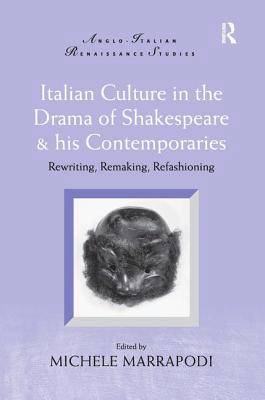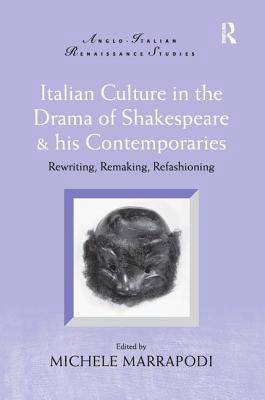
- Afhalen na 1 uur in een winkel met voorraad
- Gratis thuislevering in België vanaf € 30
- Ruim aanbod met 7 miljoen producten
- Afhalen na 1 uur in een winkel met voorraad
- Gratis thuislevering in België vanaf € 30
- Ruim aanbod met 7 miljoen producten
Zoeken
Italian Culture in the Drama of Shakespeare & His Contemporaries
Rewriting, Remaking, Refashioning
€ 202,95
+ 405 punten
Omschrijving
Applying recent developments in new historicism and cultural materialism - along with the new perspectives opened up by the current debate on intertextuality and the construction of the theatrical text - the essays collected here reconsider the pervasive influence of Italian culture, literature, and traditions on early modern English drama. The volume focuses strongly on Shakespeare but also includes contributions on Marston, Middleton, Ford, Brome, Aretino, and other early modern dramatists. The pervasive influence of Italian culture, literature, and traditions on the European Renaissance, it is argued here, offers a valuable opportunity to study the intertextual dynamics that contributed to the construction of the Elizabethan and Jacobean theatrical canon. In the specific area of theatrical discourse, the drama of the early modern period is characterized by the systematic appropriation of a complex Italian iconology, exploited both as the origin of poetry and art and as the site of intrigue, vice, and political corruption. Focusing on the construction and the political implications of the dramatic text, this collection analyses early modern English drama within the context of three categories of cultural and ideological appropriation: the rewriting, remaking, and refashioning of the English theatrical tradition in its iconic, thematic, historical, and literary aspects.
Specificaties
Betrokkenen
- Uitgeverij:
Inhoud
- Aantal bladzijden:
- 304
- Taal:
- Engels
- Reeks:
Eigenschappen
- Productcode (EAN):
- 9780754655046
- Verschijningsdatum:
- 28/11/2007
- Uitvoering:
- Hardcover
- Formaat:
- Genaaid
- Afmetingen:
- 156 mm x 233 mm
- Gewicht:
- 565 g

Alleen bij Standaard Boekhandel
+ 405 punten op je klantenkaart van Standaard Boekhandel
Beoordelingen
We publiceren alleen reviews die voldoen aan de voorwaarden voor reviews. Bekijk onze voorwaarden voor reviews.










